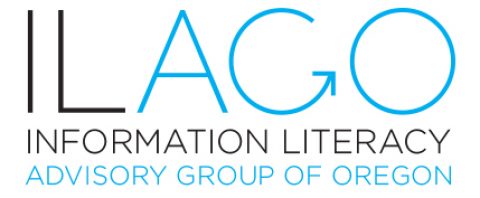Metacognitive Information Literacy Assessment (MILA)
The Information Literacy Advisory Group of Oregon (ILAGO) is initiating an exciting project to develop a shared metacognitive self-assessment tool of students’ research strategies that can be used in concert with institution-specific learning assessments. The overall goal is to work with instruction librarians to create and share an open-source assessment tool that helps establish what baseline research strategies and conceptual knowledge best supports college level work.
The project will also enable ILAGO to host important conversations around information literacy learning assessment in order to:
- Sustain a discussion in our community of educators to articulate what we value in students’ Information Literacy skills and practices as they enter college.
- Engage regional IL stakeholders such as colleagues in
- The Oregon Association of School Libraries (OASL)
- The Oregon Library Association Library Instruction Round Table (OLA-LIRT)
- The Oregon Writing Educational Advisory Committee (OWEAC)
- The Association of College and Research Libraries (ACRL) Oregon, and College Librarians and Media Specialists (CLAMS, Washington State).
Model Tool
To develop the assessment tool, ILAGO is using a model provided by The Metacognitive Awareness of Reading Strategies Inventory (MARSI). This inventory functions as both a teaching tool and an assessment of student’s self-reported reading and thinking strategies.
The MARSI was created as a result of a qualitative study (cited below) with an iterative design approach. The researchers took a large set of reading strategy statements generated by Reading faculty and, through a few rounds of student testing, pared them down to a manageable set of 30 statements in a one-page list. The strategy statements are also grouped by type so that areas of learning can be identified. The MILA workgroup is incorporating this approach while designing the first three phases a that will result in a like assessment of information literacy.
The Metacognitive Information Literacy Assessment (MILA) study builds on previous work (Catalano 2017; Mokhtari 2002; Schraw 1994) to develop a new self-report measure, and is designed to assess first and second-year college students’ awareness and perceived use of information literacy strategies while engaging in college-related research.
Mokhtari, K., & Reichard, C. A. (2002). Assessing students’ metacognitive awareness of reading strategies. Journal of educational psychology, 94(2), 249.
Project Timeline
Spring 2017
- Literature Review
- Presentation and open discussion at the ILAGO Summit, May 2017
Summer & Fall 2017
- Develop research rationale
- Outline study phases
- Draft a metacognitive statement inventory for each of the Knowledge Practices and Dispositions in the Framework for Information Literacy for Higher Education (ACRL 2016)
Winter & Spring 2018
- Share draft MILA Statement Inventory with peers and solicit feedback via a survey
- Carry out initial testing of the MILA Statement Inventory with peer-experts at the Information Literacy Summit 2018 hosted by ILAGO on May 12, 2018 at the Yamhill Valley campus of Chemeketa Community College
- Establish advisory board
ILAGO will continue to provide updates on the project and solicit future participation as the work evolves. Please contact the ILAGO project leads with questions or input:
Sara Robertson (sara.robertson@pcc.edu)
Michele Burke (michele.burke@chemeketa.edu )
Kirsten Hostetler (khostetler@cocc.edu )
Kim Olson-Charles (kolsoncharles@cu-portland.edu )
Jackie Ray (jray@bluecc.edu)
